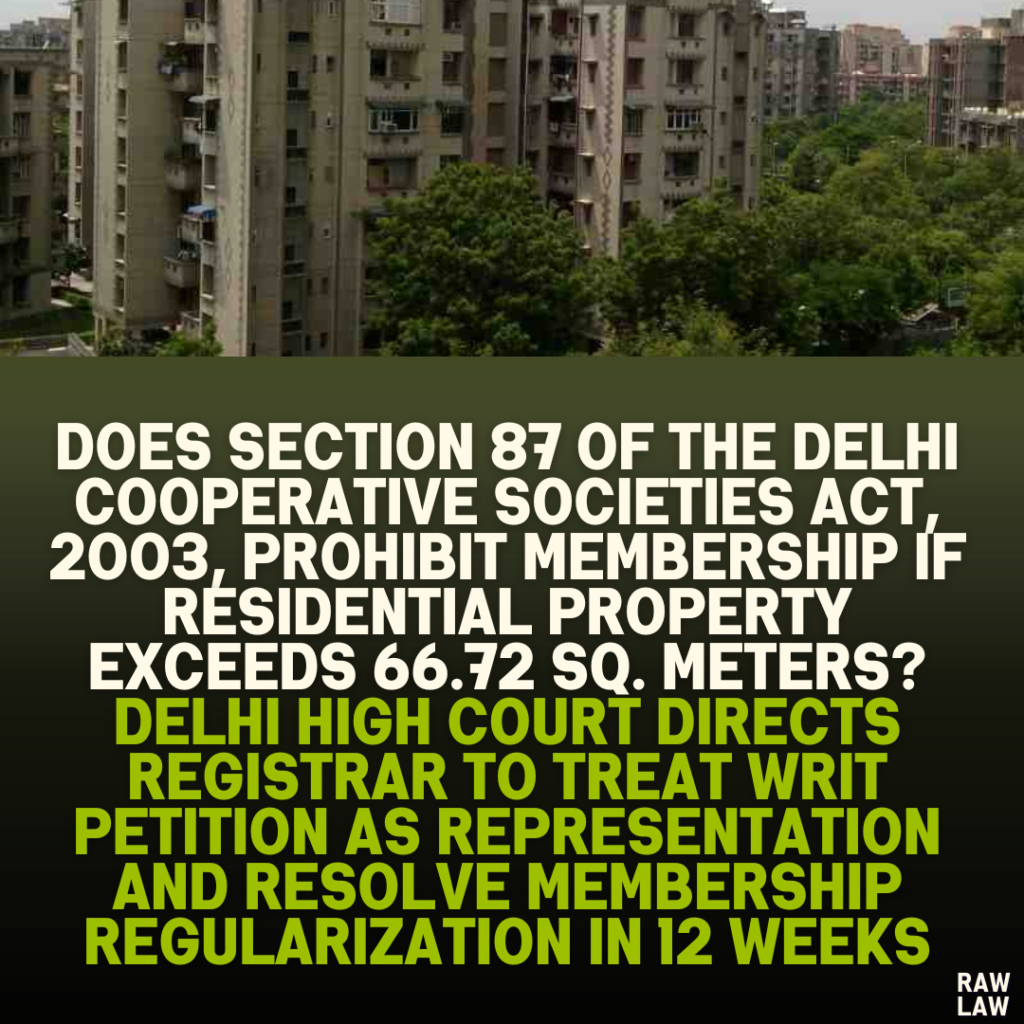Court’s Decision
The Delhi High Court directed the Registrar Cooperative Societies (RCS) to consider the present writ petition as a representation and adjudicate it in accordance with the law within 12 weeks. The court emphasized the necessity of giving a personal hearing to all affected parties while leaving the rights and contentions of all stakeholders open.
Facts
- Membership Allotment: The petitioner’s late husband was assigned Membership No. 191 in a cooperative society along with Flat No. 8 in 1994. A share certificate was issued, and possession of the flat was handed over in 1997. However, the membership was never formally regularized.
- Efforts for Regularization:
- In 2004, the petitioner’s husband made a representation to the RCS seeking regularization of membership. The RCS sought clarifications, which were provided, but no action was taken.
- After her husband’s death in 2021, the membership was transferred to the petitioner.
- Discovery of Approval: An inspection of the membership file in 2022 revealed that the RCS had approved the petitioner’s husband’s membership on October 4, 2022, but the decision was not communicated to her.
- Complaint Filed: A resident of the society lodged a complaint in 2023 alleging that the late husband owned six properties, violating Section 87 of the Delhi Cooperative Societies Act, 2003, which prohibits membership if the individual owns residential property exceeding 66.72 sq. meters.
- Petitioner’s Reply to Complaint:
- The petitioner clarified that the listed properties were ancestral or purchased after the allotment of the flat.
- A detailed representation addressing the allegations was submitted in May 2024. In June 2024, the RCS sought an explanation, which was promptly provided.
- Inaction by RCS: Despite these representations, the RCS had not taken a final decision on the membership regularization by the time of filing the writ petition.
Issues
- Whether the RCS was justified in delaying the decision on membership regularization despite verifying the petitioner’s eligibility in 2022.
- Whether the complaint under Section 87 of the Delhi Cooperative Societies Act, 2003, raised valid grounds to question the late husband’s membership.
Petitioner’s Arguments
- Eligibility Established: The late husband fulfilled all conditions for membership, as verified by the RCS. The petitioner had provided all clarifications requested.
- Complaint is Baseless: The petitioner argued that the listed properties either did not belong to the late husband or were acquired after the flat’s allotment.
Respondent’s Arguments
- Lack of Instructions: The counsel for RCS stated that no instructions were available during the hearing.
- Complaint Consideration: The RCS had sought clarification on the complaint but had not reached a conclusion.
Analysis of the Law
- Section 87 of the Delhi Cooperative Societies Act, 2003:
- This section prohibits society membership if an individual owns residential property exceeding 66.72 sq. meters in Delhi. The petitioner’s late husband was accused of violating this provision.
- Administrative Obligations: The law mandates public authorities like the RCS to act promptly and decisively. The RCS’s delay in communicating decisions and addressing complaints contravenes principles of fairness and transparency.
- Eligibility Confirmation: The resolution passed by the society and the RCS’s verification in 2022 demonstrated the petitioner’s eligibility, weakening the allegations raised in the complaint.
Precedent Analysis
While no specific precedents were cited in this case, the court followed established principles of administrative law requiring expeditious and fair decision-making by public bodies.
Court’s Reasoning
- Documentary Evidence of Eligibility:
- The RCS had verified the late husband’s membership in 2022, which was sufficient to establish his eligibility.
- The petitioner had provided necessary explanations and documentation to counter the allegations in the complaint.
- Delay and Procedural Lapses by RCS:
- The court observed that despite having verified the petitioner’s eligibility, the RCS failed to take decisive action.
- Delays in responding to representations and complaints reflected administrative inefficiency.
- Need for Hearing and Resolution:
- To ensure fairness, the court directed the RCS to provide a personal hearing to all affected parties and decide the matter conclusively within a stipulated timeframe.
Conclusion
The court disposed of the petition, directing the RCS to:
- Treat the writ petition as a representation.
- Resolve the matter in accordance with the law within 12 weeks.
- Provide a personal hearing to all affected parties.
The court left the rights and contentions of all parties open for further adjudication if necessary.
Implications
- Accountability in Cooperative Societies: This judgment highlights the necessity for transparent and timely administrative actions by cooperative society regulators.
- Protection of Rights: The ruling safeguards the petitioner’s rights by mandating a fair hearing and ensuring adherence to legal procedures.
- Prevention of Administrative Delays: The decision underscores the importance of expediting administrative processes, setting a precedent for similar cases involving delays by public authorities.
